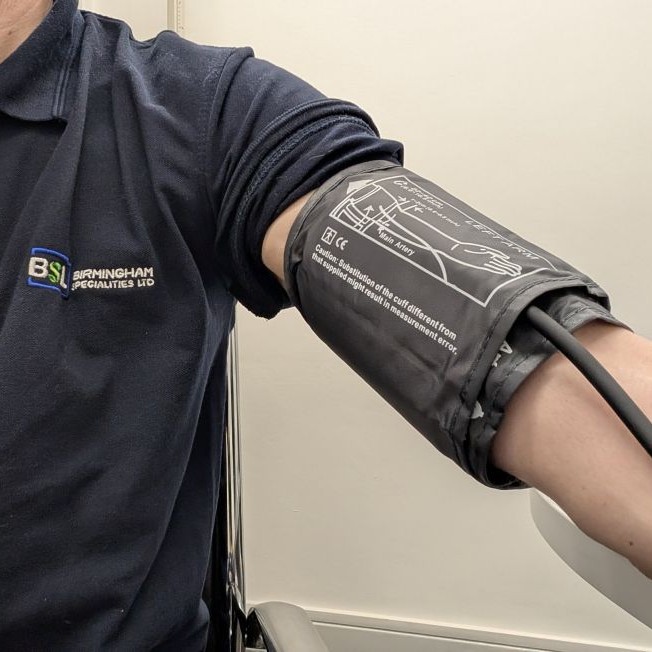Industry News/Manufacturing
It’s Coming Home: The UK Manufacturing Shift Towards Reshoring
21st July 2020
TABLE OF CONTENTS
1) Data Disclaimer
2) Introduction
3) Why Do Businesses Choose To Offshore Manufacturing
4) Why Are Businesses Now Reshoring Manufacturing
5) Addressing Possible Problems
6) What Can UK Businesses And Individuals Do
7) Closing Summary
8) Conclusion
9) Further Resources
Introduction
The manufacturing industry broadly encompases all of the sectors which produce goods through labour, machines, tools or processing of some kind. The UK manufacturing industry is the 9th largest in the world, while competing against some of the most innovative and progressive countries across the globe. While it’s output is surpassed by the likes of China and the USA, the UK remains far ahead of Brazil, Russia and Canada.

It is a huge industry, employing 2.7 million people and accounting for 53% of the UK’s total exports. This means that it is a huge contributor to the economy, and that it is relied on by a lot of people, both for jobs and goods. It also means that the actions and trends of the manufacturing industry are significant, because of their wider influence and impact.
The graph below indicates that in 2018, revenue from the UK manufacturing sector was $727 billion. It was then predicted to reach $814 billion by 2024. This is an 11.96% increase in just 6 years, demonstrating the competitive nature of the industry. It is also testament to both its immensity and longevity, and its significance to the economy on both a national and international scale.

Shoring
The significance of the manufacturing industry means that it is important to develop a comprehensive understanding of the sector. Manufacturing was previously offshored to different countries across the globe, and it is now being reshored back to the UK. Manufacturing is coming home, but it is important to understand exactly what this means.
There are 4 main kinds of shoring which will underpin this whitepaper:
Offshoring, Nearshoring, Direct Reshoring and Indirect Reshoring.
Offshoring
Offshoring is when a process or service is carried out overseas. The motivations behind this will be examined in the first section of the whitepaper. It is a practice typically employed by large businesses or governing bodies.
Nearshoring
Nearshoring is when a process or service is carried out in a nearby country. For UK manufacturers, this can be as close as Ireland. Other favourable countries in Europe include Poland (often considered the “nearshoring capital” by multiple sectors), Romania and Bulgaria. These are the countries which are within an attractive distance, while having significant developments in relevant technologies, or large amounts of skilled workers.
Direct Reshoring
Direct reshoring is when offshore work is relocated back to the UK. This means that the business previously made the decision to offshore work somewhere else in the world, and has then made the decision to bring this work back to the UK.
Direct Reshoring
Indirect reshoring is when a business decides to increase production within the UK. Their growth and production strategy are centred around working on home ground. They do not, however, reverse any previous decisions, and so while future work will take place in the UK, they may continue to offshore some processes.
This Whitepaper
Direct and indirect reshoring are the central focus of this paper, and will largely be referred to in tandem, as “reshoring”. This is because the two practices are consumed by the overarching aim of conducting manufacturing work in the UK- in other words, bringing it home.
This whitepaper will examine the practice of reshoring manufacturing. It will undertake a comprehensive approach, providing the reader with a clear understanding of the past, present and predicted future of the manufacturing industry.
It will begin with an exploration of offshoring, to better understand why businesses choose to offshore their work. This reasoning will then underpin why businesses are reshoring manufacturing. The shortcomings of offshoring directly contribute to a surge in reshoring practices. To be as informational as possible, this paper will then address the potential problems with reshoring, before suggesting possible solutions.
Why Do Businesses Offshore Manufacturing
- Low manufacturing costs
- Cheap raw materials
- Specialist workers and technology
- Focus
- Worth pursuing?
Businesses offshore manufacturing based on four general factors:
- Financial Attractiveness
- People Skills and Availability
- Business Environment
- Digital Resonance.
As evident on the graph, each is a contributing factor towards why a specific country is chosen. This is also determined by the requirements of the business, and the budget and time constraints that they are working within.
India and China are both hugely attractive countries to offshore to, and this is not exclusive to the manufacturing industry. Sectors across the globe choose to offshore their business to these countries because they offer something that their home country does not. The factors on the graph broadly outline these motivations, and within these, some of the most important include: low manufacturing costs, access to cheap raw materials, access to specialist workers and technology and the opportunity to focus on different priorities at home.

Low manufacturing costs
Perhaps the most financially attractive element of offshoring is the lower manufacturing costs. This is because offshoring to countries such as China and India offered significantly lower manufacturing costs than in the UK. These costs cover everything from skilled workers and technology to shipping.
UK businesses chose to offshore in order to save money, while still accessing the same high quality product or service. As the below chart indicates, 43% of businesses were motivated by reduced costs. The money that they saved could then be used in other areas of the business, or to engender a larger profit margin.
Foreign countries were able to offer these lower costs because of their geographical location, and wider welfare policies. They had easier access to raw materials, which we’ll discuss momentarily, and provided a lower wage to their employees, because the minimum wage was significantly lower than in the UK.
Due to large-scale offshoring practices, there were often already-established factories within these countries, containing the necessary equipment and the skilled workers. This meant that there was no need to pay for and source these essential elements, as they were in place and readily available.
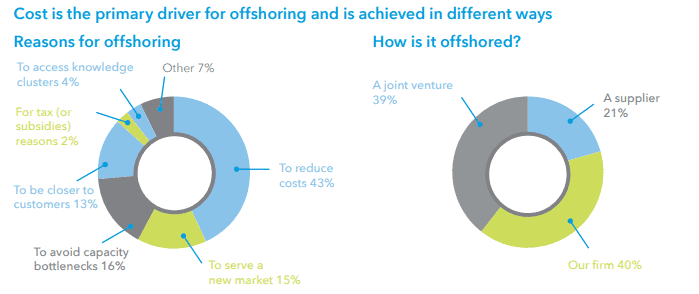
Cheap Raw Materials
Access to cheaper raw materials is also an attractive reason to offshore manufacturing. These materials were typically cheaper for two reasons: they were native to the country in question and so easier to access, or their price was influenced by the country’s currency, economy or wholesale pricing (and so was comparatively cheaper than the UK).
The raw materials being native to the country has further benefits, as it can result in the existence of a smaller supply chain. This is significant, as offshoring results in a distinct lack of control for the business, and so a smaller supply chain works to minimise risk.
Using these cheap raw materials could be a lucrative business decision, as the monetary gains could be incorporated into the sales strategy. Businesses could charge a lower price for the end-product, and gain a competitive advantage within the marketplace. Alternatively, they could price the end-product appropriately and yield a greater profit margin.
Specialist workers and technology
Another reason that businesses chose to offshore is for access to specialist equipment, and skilled workers. 4% of businesses considered accessing knowledge clusters as the primary motivation for offshoring (as indicated on the above graph).
This kind of expertise may not have been available or accessible in the UK for a variety of reasons, such as high costs and increased demand. This means that finding a suitable manufacturer abroad often proved to be the most effective option.
These manufacturers were typically firmly established, meaning that they were capable of starting the necessary work immediately. This was useful for minimising lost time, and getting the absolute most out of offshoring.
Focus
Finally, offshoring allowed businesses to focus on areas of interest at home. This means that they could manufacture and produce the products and services within their own areas of speciality, while accessing the necessary skill and innovation elsewhere. This strategy allowed operation across multiple sectors, and increased accessibility to the marketplace.
Offshoring also gave businesses a firm foothold in foreign countries, which enabled them to use this to their advantage. It was an easy means of accessing the local economy for that country, and participating in the global marketplace, as they had an active presence in said country.
Worth Pursuing?
These are all really great reasons as to why businesses offshored their manufacturing. However, they do not all ring true in the present day. Times are changing, and offshoring no longer poses these strategic advantages.
Foreign countries no longer have the monopoly on being the best or the cheapest or the most skilled. Instead, a combination of factors have rendered most of the benefits of offshoring obsolete, and others not worth pursuing. This has resulted in a wider industry trend towards reshoring.
Why Are Businesses Reshoring Manufacturing
- Geopolitics
- Rising costs
- Supply chain and lead time
- Overreliance
- Communication
- Localisation
- A perfect scenario?
The practice of reshoring is not a new phenomenon. In fact, it is a trend that has readily been gathering speed since as early as 2012. At this time, healthcare giant GlaxoSmithKline (GSK) announced plans to invest £500 million in a UK manufacturing plant- the first time that the business had built a UK-based factory in 40 years. Since then, reshoring has been the subject of much academic research and debate, and is frequently speculated about in the news.
The act of reshoring manufacturing is also a common business topic, and the subject of much future planning and strategic thought. The graph depicts how businesses in different sectors expect their spend to shift within a 12 month period.
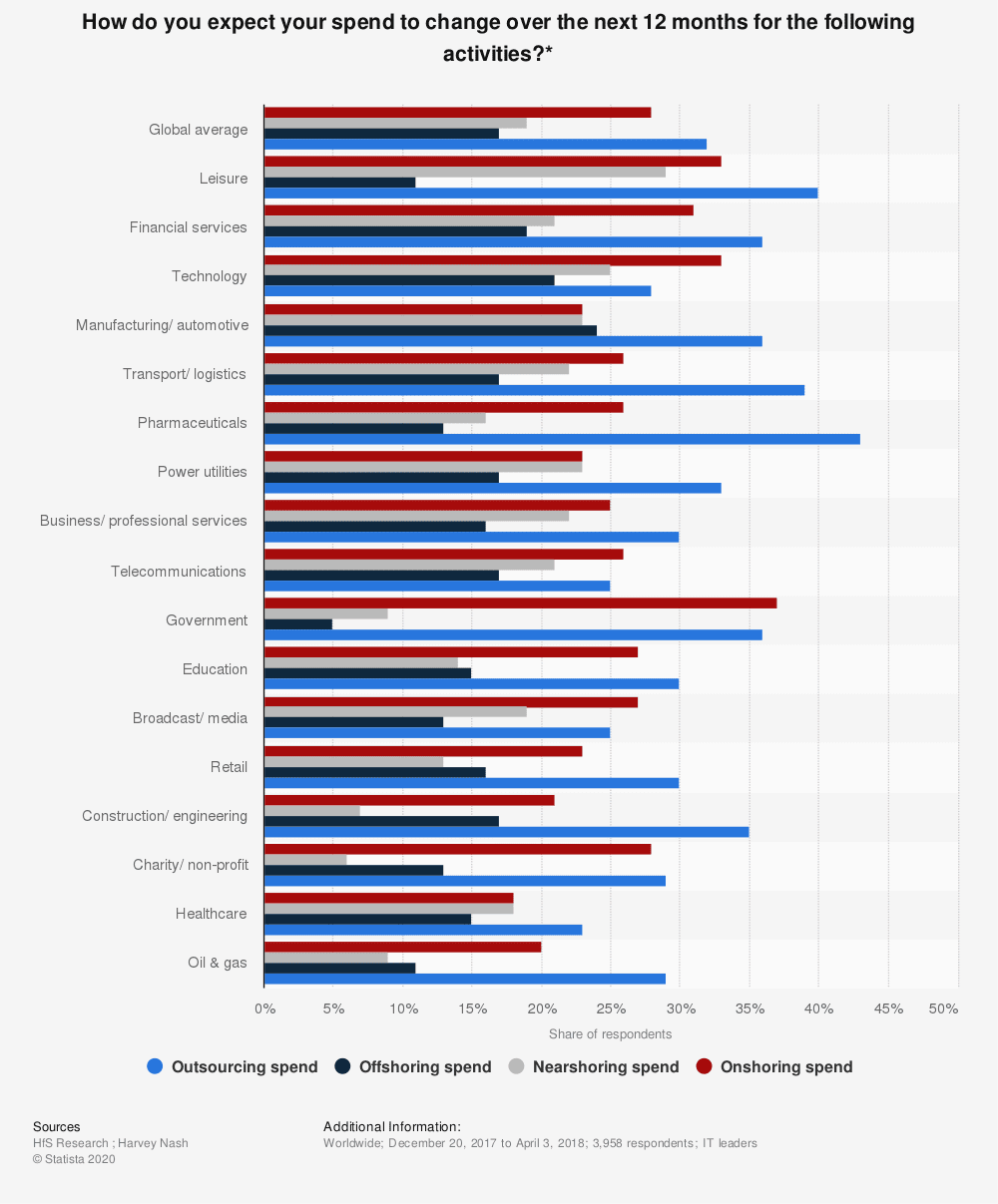
There is an interesting discrepancy between offshoring spend and onshoring spend. The global average of onshoring spend is significantly higher than that of offshoring spend, which speaks to a wider global trend: sectors predict that they will spend more money at home than abroad. This is significant in itself, because it demonstrates that overall, there is a shift away from offshoring and towards reshoring. That it is a global shift, demonstrates that reshoring is not unique to the UK.
The manufacturing / automotive industry predicts that 23% of spend will be onshore, while 24% will be offshore. The transport / logistics industry predicts that 26% of spend will be onshore while 17% will be offshore. The construction / engineering industry predicts that 21% of spend will be onshore while 17% will be offshore. All three industries are closely interlinked, and contribute to the more general concept of the manufacturing industry. They also all contribute towards the definite trend towards reshoring, as they indicate a higher predicted onshore spend than offshore.
The below graph demonstrates where business is being reshored from. It is significant to note that countries that proved the most attractive when offshoring are those that are experiencing the highest movement.

This graph shows that over 40% of reshoring is returning from China, and almost 20% is returning from India- the two most attractive countries in the previous graph.
Together, these two datasets highlight that businesses across the globe are reshoring. While they don’t expand on the reasoning behind this, there are obvious connections between the disadvantages in offshoring and the corresponding advantages of reshoring.
Geopolitics, rising costs, supply chain and lead time, overreliance on foreign countries, poor communication and a desire for localisation are all key factors contributing to the reshoring of manufacturing.
Geopolitics
Offshoring comes with a huge geopolitical risk, making it one of the most common reasons for businesses choosing to reshore. These risks include inflated fees, trade wars, national disasters and pandemics. In 2020 and 2021 alone, it’s incredibly easy to see why there has been, and will continue to be, a return to manufacturing in the UK.
The two most common geopolitical factors of late are Brexit and Covid-19. Both have significantly damaged economic conditions, international relations and international trade.
In the latest Manufacturing Barometer produced by the South West Manufacturing Advisory Service (SWMA) and the Manufacturing Growth Programme (MGP), it was revealed that 65% of companies have seen negative price changes within their supply chain since leaving the EU. Moreover, 56% of companies have experienced difficulties accessing raw materials. This demonstrates that the current geopolitical conditions have made offshoring increasingly difficult, with issues that would not occur if manufacturing was conducted solely in the UK.
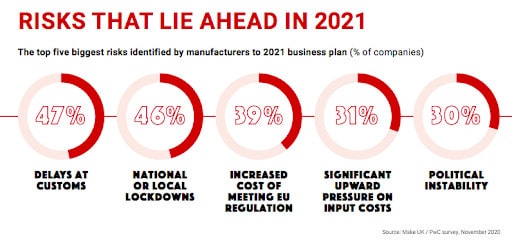
The above infographic depicts the biggest risks for the future of manufacturing, as identified by manufacturers themselves. Each can be largely attributed to different geopolitical factors, causing delays, shortages and general difficulties which increase cost and time spent.
Rising Costs
Rising costs is a strong influencing factor as to why many businesses are reshoring. 39% of businesses are concerned about the increased cost of meeting EU regulations and 31% are concerned about the upward pressure on input costs, however, the financial disadvantages of offshoring do not end there.
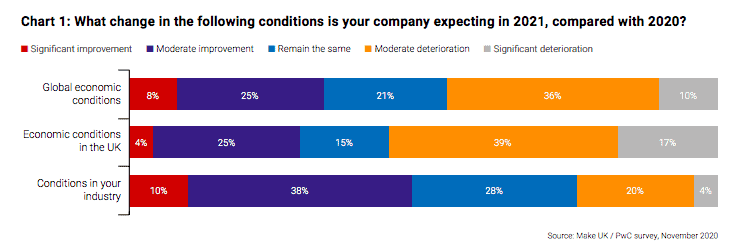
The above data concerns changes to the industry, UK and global economic conditions. Across each, the figures of a moderate or significant deterioration are notably higher than those for any kind of improvement. This suggests that economic conditions, on all scales, is a cause for concern. Perhaps most interesting is that 36% of businesses predict a moderate deterioration of global economic conditions, and 10% predict a significant deterioration.
They demonstrate a clear negative expectation of global economic conditions, which will greatly influence offshoring and reshoring because of how the economy affects transport, trade and the manufacturing sector as a whole.
The rising costs of transport, shipping containers and labour are all hugely significant contributors to the reshoring trend. Not only is transport more expensive than it used to be, but new regulations means that it is a lot more time consuming- resulting in a longer lead time, which we’ll cover momentarily.
The cost of shipping containers is one of the biggest reasons why businesses are returning to the UK. Ellard, a company within the Indutrade Group, has reported the rising cost of shipping containers as 5 times higher than it was 5 years ago. This means that, to make it cost effective, it is only reasonably worth shipping larger volumes. The necessity of bulk ordering is thus another reason for the turn to reshoring.
Supply Chain and Lead Time
Both the supply chain and the lead time are heavily influenced by the aforementioned geopolitical factors. The SWMAS and MGP report also revealed that 54% of companies had complications when it came to exporting, and 56% had complications when it came to importing, since Brexit. This was due to difficulties within the supply chain, resulting in a longer lead time for both completing the manufacturing process and for being available for sale.
Only 6% of companies believe that they have full visibility over their supply chains. Operating entirely from the UK increases the likelihood of this number increasing, as it is easier to maintain an awareness when you’re both on the same soil.
The below graph highlights the strategic importance of reshoring; businesses that begin to manufacture within the UK do so in order to prioritise lead time and flexibility. The decision to reshore is consequently heavily dependent upon the ethos of the individual business, and how much emphasis they place on what is ultimately client satisfaction.

Overreliance
An overreliance on foreign countries for vital items and services can lead to trouble and inconvenience further down the line. This is another factor that is heavily influenced by geopolitics, and for which prime case studies can be drawn from both Brexit and Covid-19. For example, masks had to be manufactured by companies previously dedicated to different sectors, because the UK couldn’t source enough, fast enough.
The best, and most relevant, example of this is the different UK manufacturers that began to produce PPE. Key names include Aston Martin, Dyson, John Lewis and Barbour.
Communication
Conducting business entirely in the UK offers huge advantages when it comes to communication. It affords the business more control, as it is easier to oversee what is happening and make and implement sudden decisions.
In this same vein, native communication is much easier and much quicker. This is because there are no time zone differences or distance charges to contend with. It also makes it easy to visit the manufacturer in person, and to gauge a good sense of their work ethic, productivity and whether they are fit for purpose.
Localisation
Reshoring manufacturing means that it is all being carried out in the UK. Working locally is great for the local economy, providing jobs and boosting expenditure. The below graph indicates that reshored companies enjoy access to qualified personnel, skill, technology and innovation. There is consequently an emphasis on accessing a skilled workforce, made up of specialists in that area. This was previously an advantage of offshoring, and so it is ultimately testament to how times have changed: these same advantages of offshoring are now readily available in the UK, making reshoring a very attractive practice.

It also affords more control and faster response rates. As with communication, there is significantly less delay.
Localisation is also better for customers. Not only does it feed into the support local businesses approach which has swept the UK over the last few years, but it makes it much easier to access the end product and services, as well as any support needed for them.
A Perfect Scenario?
In order to present a well-rounded picture, it’s important not to take these factors at face value. Reshoring is happening as we speak, but there are pitfalls to be aware of. Taking these into account means that you can adjust your business strategy accordingly.
Addressing Possible Problems
1) Visibility
2) Cost
3) Time
4) Not just the UK
The movement of manufacturing from abroad to the UK isn’t without its challenges. This is because in order to reshore, businesses need to find somewhere in the UK that can accommodate their needs. They also need to transition from operating abroad to operating at home. The key factors that they need to consider can be broken down into visibility, cost and time.
Visibility
The UK is full of viable manufacturers capable of performing the same work as those abroad, and producing the same high quality. However, visibility within the manufacturing industry is incredibly limited.
One reason for poor visibility is because businesses typically operate from a list of known manufacturers. This list is often compiled over time, through reputation and word of mouth. This means that smaller or less prolific manufacturers are overlooked.
Moreover, the UK-based manufacturers that are on this list are not chosen because of associated risk factors. While China is associated with being a low-cost manufacturing country, the UK is often associated with being more expensive. As is now evident, this is no longer the case.
Another reason for poor visibility is a lack of digitisation. Many manufacturing firms fail to capitalise on the digital age, and a lack of online presence makes it difficult to discover them- even if they’re the perfect candidate for the job.
This highlights that the best possible way to find a UK based manufacturing company, or to be seen by a business looking for a UK based manufacturing company, is to be as prolific as possible. This includes networking, joining directories, being active on social media, using LinkedIn and having a website.
Cost
The biggest problem when it comes to reshoring, and the factor that deters most businesses, is the associated cost. This is because, while it may prove cost-effective in the future, making the transition to operating entirely in the UK can be an expensive and intimidating process.
The main cost is in regards to equipment and tooling. This is because you may have to repurchase all of the items that you require for performing the job at home, despite having had them abroad.
You may also have to double up on capex for the equipment and tooling. This is an especially frustrating cost, as you are paying for something at home that you have already paid to the offshore supplier.
Finally, switching manufacturers itself can prove expensive. This is because you first need to hire the UK manufacturer, the cost for which depends on their fees. However, you may also have to continue paying the offshore manufacturer at the same time, depending on the rules laid out within your contract. There is also the amount of time that it takes to find a suitable home-based manufacturer, as the interim period could prevent manufacturing of any kind and cause you to lose or stop making money.
Time
Finding a suitable UK-based manufacturer can be incredibly time consuming, largely because of the factors we have previously mentioned. The diagram shows just how large the UK manufacturing industry is, as it is spread throughout the country.
With so many manufacturers to choose from, a great deal of consideration must be given to who you choose. You need to take into account location, ease of access, size and output, amongst other factors. The largest output can be found in the North West of England, at £28.5 billion a year, however this location may not be convenient for a business based in Northern Ireland, where output is only £5.2 billion a year. It is yet another factor that should be weighed up accordingly by the individual business.
Even once a manufacturer has been resourced, there will be significant admin time, something that is often overlooked when reshoring is considered. It takes time to establish an effective working relationship with a new team, and to ensure that everyone is on the right page (especially when it comes to quality, lead time and other significant factors that can make or break a business).

Not Just The UK
Reshoring is rapidly becoming a prominent trend in the UK manufacturing industry, but it is also part of a much wider pattern. The global manufacturing industry demonstrates an inclination towards reshoring. This is especially true for countries such as the USA.
As the graph above demonstrates, labor costs in China are now significantly higher than the USA and Mexico. It is consequently clear to see why the USA is now adopting a reshore and nearshore strategy in places, and why the UK is using this same practice.
As it’s not just the UK reshoring, it could have an impact on the UK itself. Whether this will prove to be a good or bad thing remains to be seen.

What Can UK Businesses And Individuals Do
1) Lateral Thinking and Cross-Fertilisation
2) Directories and Groups
3) UK Investment
4) Financial Support
Reshoring has potential problem areas, but there also many things that UK businesses and individuals can do to mitigate these problems and lessen the difficulty of such transitions. Many of these things are in-line with the feel and thought of the general public, in that they cater to their best interests and capitalise upon trending notions such as “support local businesses”.
Lateral Thinking and Cross-Fertilisation
Implementing lateral thinking into your wider business plan, and into your reshoring strategy, can be incredibly beneficial, on both a small and large scale. This is because it requires you to incorporate a kind of creativity and problem solving that is not always conventional. Doing so allows you to expand your business in areas you may not have considered, without ever leaving the UK.
The best possible example of lateral thinking and cross-fertilisation can be found in the Covid-19 pandemic. Automotive companies, highly skilled at what they do, began to manufacture and supply essential PPE equipment in response to the national shortage. This crossover between sectors, and the different use of similar technical skills, is a small example of what the wider manufacturing industry is truly capable of.
Directories and groups
Businesses and individuals should look to directories and groups in order to find UK based manufacturers. Doing so for both direct reshoring and indirect reshoring means that these companies have a higher opportunity to receive the support and business that they need to remain in operation. It is thus good for both parties, allowing businesses and manufacturers to thrive in tandem.
Directories and business groups are a source of locality and stability. Directories provide a roundup of viable manufacturing companies that meet your specifications – especially when it comes to location and pricing. A great example of a manufacturing directory is Make it British. They have created an accessible community of UK brands and manufacturers.
Similarly, manufacturing groups can help you to find a company that promises longevity and durability despite geopolitical factors. A great example of a manufacturing group is Indutrade, an international industrial group whose businesses receive support and guidance as needed, allowing them to remain competitive and competent.
UK Investment
Reshoring ultimately requires a fundamental transformation of the industry. This means that UK businesses need to invest their time, money and resources differently.
It is also an opportunity to look locally from the very beginning. The below graph shows the different advantages of operating from the UK: not just reshoring, but the business environment throughout. Operating solely in the UK provides businesses with an advantage when it comes to reputation, branding, quality of suppliers and intellectual property protection.
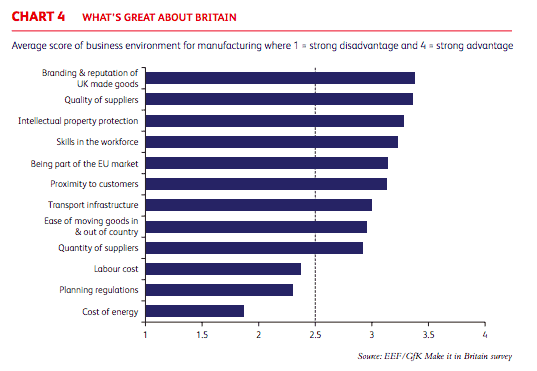
The only area on the graph that could be interpreted as a disadvantage is cost of energy, yet this is something that is open to interpretation and that will naturally vary based on perspective and a variety of other factors.
This UK-first approach allows the consideration of the potential problems of offshoring from the beginning. This means that it isn’t looked at as an instant cost-effective solution, but as something to be approached with extreme caution due to its volatility.
Financial support
These same principles apply when starting any business in a new location: it is sometimes essential to seek financial support. When it comes to reshoring, it is possible to seek financial support from the reshoring supplier to help with capex. For example, they can help with the amortisation of tooling across parts.
Closing Summary
Businesses have been offshoring manufacturing for decades. This is because it previously offered low manufacturing costs, access to cheap raw materials and specialist workers and machinery, and the ability to focus on areas of interest at home. However, these factors are no longer the reality of offshoring; it is no longer the lucrative business venture that it is advertised to be.
Offshoring is no longer a wholly viable strategy for businesses due to a lack of stability, and to the ever changing and innovative nature of technology and development. The increase in controversial geopolitics, the rising cost of manufacturing, difficulties within the supply chain, an increased lead time, an overreliance on foreign countries, difficulties communicating and a desire to localise are all factors that have led to a movement away from offshoring, and to the rise of reshoring. Reshoring addresses all of the problems associated with offshoring, and appears to mitigate them.
However, it is accompanied with its own dangers. Lack of visibility, high associated costs, increased time lost and a worldwide trend are all things to take into consideration. To do so effectively, there are different things that businesses and individuals can do, and should already be doing. This includes thinking laterally, seeking financial support, looking to directories and trade groups and investing in the UK.
Conclusion
The movement away from offshoring began over a decade ago, and it is one that is accelerating rapidly as we move into the 21st century. This is because the previous advantages of offshoring are no longer as relevant, or as competitive, especially when compared to the innovation and advancement of European countries and the UK itself. It is these developments that make nearshoring and, as is the focus of this whitepaper, reshoring, the strategic choice for businesses of all sizes when looking for a manufacturer.
UK manufacturers offer quality, service and speed that often outperforms that of other countries. In Chart 7, it is overwhelmingly evident that both SMEs and large-scale corporations are choosing to work with UK manufacturers because of their reliability, logistics and reduced costs in certain areas. These are valuable factors that are not afforded by offshoring.

It is also evident that there is a clear future interest in reshoring; it is not a trend that will disappear anytime soon. Instead, it demands wider change within the manufacturing industry to accommodate UK growth.
With businesses interested in both direct reshoring and indirect reshoring, it is essential that they do what is best for both themselves as a business, and the country as a whole. The UK’s manufacturing sector should be chosen over offshoring to another country because it is the best and most strategic option, based on data rather than a sense of patriotism.
It is due to this that reshoring is underpinned by rightshoring: operating in a location because it is the most effective available. This is evidently the nature of the UK, and further developments in manufacturing and technology suggest that it is highly likely that the competitive reputation of the industry will only continue to grow.
For now, we can conclude that manufacturing is indeed coming home.

Further Resources
For further information on reshoring, visit reshoring.uk. The Reshoring Initiative is at the heart of the reshoring movement, highlighting the strength and innovation of the UK manufacturing industry. They provide a wealth of information and materials, and spread knowledge and news as needed.
Equivalent initiatives exist across the globe, championing a return to native land, which only serves to reiterate the breadth and importance of this wider industry trend.
Data Disclaimer
The data included within this whitepaper is from the last decade. This is because it is indicative of a wider trend within the industry, thus useful for understanding the present state of manufacturing and predicting what may happen in the future. It is also due to the nature of the data: much of it pertains to information which takes time to collect and organise, and so data from as early as 2017 is not released until 2020, and so forth. Data is largely unavailable for the present moment, due to these long processing times and the sensitivity of the information. It is too recent to have existing and reliable data sources.



